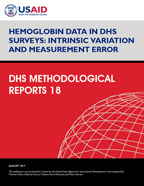The New Nutrition Team

Did you know that nutrition is one of the most published topics using data from The DHS Program? This shows what a major resource The DHS Program is for nutrition-related policy, programs, and research. Recognizing the important contribution of nutrition data, two new nutrition experts have recently joined The DHS Program team, Drs. Sorrel Namaste and Rukundo K. Benedict.
As our new nutrition experts, they will manage all aspects of nutrition data collection and use, working to:
- Ensure provision of high-quality nutrition data within The DHS Program
- Explore innovations for nutrition data in low- and middle-income countries
- Support evidence-based programming and policies with relevant and timely nutrition data
- Build capacity in nutrition data measurement, analysis, and use around the world
 Some of The DHS Program’s recent activities on nutrition include the new Hemoglobin report, and we are also currently seeking applications for the 2018 DHS Fellows Program. To stay up-to-date with more nutrition activities, sign up for our upcoming nutrition newsletter.
Some of The DHS Program’s recent activities on nutrition include the new Hemoglobin report, and we are also currently seeking applications for the 2018 DHS Fellows Program. To stay up-to-date with more nutrition activities, sign up for our upcoming nutrition newsletter.
So join us in welcoming our new nutrition team in the comment section, and learn more about them in their bios below. If you still have any questions or comments, you can reach out to them directly at nutrition@dhsprogram.com.

Dr. Sorrel Namaste is the Senior Nutrition Technical Advisor for The DHS Program. She is an epidemiologist with expertise in nutrition assessment and implementation research. Dr. Namaste has a particular interest in the use of data to strengthen the feedback loop between the scientific, policy, and implementation communities. Prior to joining The DHS Program, she was the Anemia Team Lead for the USAID-funded SPRING project. In this capacity, she provided technical assistance to governments to develop national strategies, supported program implementation, and contributed to the formation of global policies. Previously, she also worked for the National Institutes of Health (NIH) where she was responsible for supporting large-scale global nutrition research projects. While at NIH, she served as the co-principal investigator on the Biomarkers Reflecting Inflammation and Nutrition Determinants of Anemia (BRINDA) Project. She completed her DrPH at George Washington University and holds an MHS from the Johns Hopkins Bloomberg School of Public Health in Global Epidemiology.

Dr. Rukundo K. Benedict is a Nutrition Technical Specialist for The DHS Program. She is a public health nutrition practitioner with expertise in infant and young child feeding (IYCF), water-sanitation hygiene (WASH), community health systems and the delivery of integrated interventions in low-resource settings. Prior to joining The DHS Program, she worked as a postdoctoral associate at Cornell University on policy and program relevant projects. She led a project with UNICEF South Asia to examine the epidemiology of breastfeeding in South Asia and to explore the effectiveness of strategies to support breastfeeding and maternal nutrition and infant feeding counseling. She also conducted implementation research on the delivery of nutrition and nutrition sensitive interventions by community health workers in the Sanitation Hygiene Infant Nutrition Efficacy (SHINE) trial in rural Zimbabwe. She has a PhD in International Nutrition from Cornell University and an MSPH from Johns Hopkins Bloomberg School of Public Health.
Don’t miss another blog and subscribe to receive email alerts for new posts.
Photo Caption: Hemoglobin analysis in DHS surveys in carried out with a portable HemoCue analyzer

